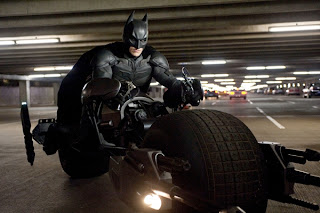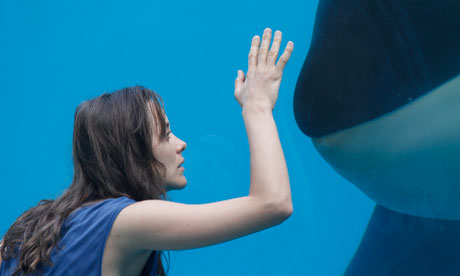 |
| Welcome back, Batman. |
“The Dark Knight Rises” will elicit hours worth of conversation. However, it won’t be about the political subtext ripped from today’s headlines as you might have expected. It will consist of a lot more pondering about where Christopher Nolan went wrong, and how the finale of a masterful saga could be such a dissapointment.
When Christopher Nolan first brought “Batman Begins” to the world, he was introducing a brand new Batman to a new generation of fans. Then, when “The Dark Knight” came out, he had made something unlike any action movie made before it. In “The Dark Knight Rises,” he tends to rely on all of the uninspired tropes that he was once so good at ignoring.
The final installment of this Batman trilogy has a muddled plot that shines at certain points. It takes place six years after the death of Harvey “Two-Face” Dent (Aaron Eckhart) and the disappearance of the caped avenger, after Batman takes the fall for Dent’s death. Gotham is now in a time of peace. Deprived of his heroic identity, Bruce Wayne (Christian Bale) spends his days living in isolation in Wayne Manor. During this time, Wayne has become crippled as his family empire crumbles. He hosts parties that he doesn’t attend. He grows a beard and never comes out of his room. While people think that he has turned into Howard Hughes, Wayne actually manages to keep most of his sanity intact.

It’s sad to say, but “The Dark Knight Rises” manages to share the same plot as “MacGruber”: a hero is shunned by society, goes into hiding, can’t get over the loss of his one true love, and is eventually called back into action because he is the only one who can defeat the latest threat to the world. Wayne has refused to move on with his life, which sends his loyal butler Alfred (Michael Caine) packing. What Alfred, as well as Christopher and Jonathan Nolan, neglect is the fact that Batman is Bruce Wayne’s true identity, and not the other way around.
With The Joker and Two-Face out of the picture, the latest threat to Gotham is Bane (Tom Hardy), a psychopath in a mask that makes him look like a prawn from “District 9.” Bane, like a demon emerging from hell, was raised underground where he gained unmatchable strength and a dark view on humanity. Now, Bane raises an army of lower class warriors in the sewers of Gotham, as he prepares to wage war on Gotham’s wealthy, and restore power to the people.
Bane is certainly a frightening looking villain. Too bad he couldn’t actually be one of the most frightening. Bane’s voice had to go through some altering in the editing room to make it more audible. However, his new voice sounds less like Darth Vader and more like Gandalf. A man preaching about the destruction of a city should not sound sagely. In addition to that, some damage is done by providing too much of Bane’s backstory. Besides Ledger’s performance, what made The Joker work so well is that so little was revealed about him. There is not enough mystery surrounding Bane. He should have been elusive, not wimpy. Hardy is a very talented actor (see “Lawless” when it opens in August), but this was not necessarily the best showcase for his talent, especially when all of his facial expressions are masked.

“The Dark Knight Rises” makes a fatal mistake by setting the stakes monumentally high. Among the many new things that it introduces is Miranda Tate (Marion Cotillard), the newest member of the board of Wayne Enterprises, who helps build a nuclear reactor below Gotham that will give the city clean energy. However, Bane turns it into a bomb, with the intent of blowing Gotham to smithereens. The class warfare powers the film at the beginning, and brings it eerily close to today’s headlines. However, adding in the total destruction of Gotham makes the conflict too big. Recall the two boats in “The Dark Knight.” Every time I watch it, I become deeply invested in which boat could blow up because it is a smaller conflict, and we get to know everybody involved.
On a more positive note, there are a few new characters who add to the story. One of them is John Blake, a young cop played by Joseph Gordon-Levitt. It may be partly because Gordon-Levitt can do no wrong in my book. Also, he is an engaging new perspective on the battle for law and order in Gotham and in the end, one move he pulls off very much evokes Marshall Will Kane of “High Noon.” Also introduced is Selina Kyle, better known as Catwoman (Anne Hathaway). Catwoman is like a Robin Hood for Gotham’s needy. She is a stealthy thief who only meets her match when she first tries to mess with Bruce Wayne. While a failed “Catwoman” movie was made a few years back, Nolan’s Catwoman could merit her own spinoff.
Unfortunately, like many of the great aspects first set up in “The Dark Knight Rises,” it is eventually ruined by the time the film’s nearly three hour run time comes to a close. Her moment of redemption felt contrived and out of place. Catwoman is constantly straddling the line between hero and villain, as she works mainly for herself as opposed to the greater good, so why not just make her a straight up anti-hero?

The contrived fate of Catwoman pretty much sums up most of the other mistakes made by “The Dark Knight Rises.” I do not want to give away too much, so I will just say that there might as well have been Ewoks dancing around.
As everyone expected, “The Dark Knight Rises” is visually striking, even if the action scenes are clunkier than those from its predecessor. It is also the cinematic equivalent of a lingerer: it spends too much time in places where it could have gotten itself out of much quicker. Bruce spends an awful lot of time trying to escape a hole in the ground. Montages were invented for a reason, and could have been put to good use here.
The weaknesses of “The Dark Knight Rises” expose Nolan’s weaknesses as a filmmaker, which were often visible in his other works but always redeemed by his strengths. For example, his characters have a habit of explaining too much when they could just let their actions do all of the talking for them. This was the biggest flaw in “Inception,” yet the striking visuals and action sequences covered up for it. In “The Dark Knight,” it worked because their words were so powerful and were so on point thematically. “The Dark Knight Rises” is at its best when its imagery evokes history. The trials and storming of the houses of Gotham’s rich feels like politics straight out of the Robespierre era. Meanwhile, watching cops trying to dig themselves out of rubble is a heart-wrenching reminder of the events of 9/11. Nolan needs to trust his abilities as a filmmaker, as well as the intelligence of the audience. That way, we will never have to see an exchange like this ever again:

Side note on the location of Gotham City: In “Batman Begins” and “The Dark Knight,” Gotham was modeled almost entirely after Chicago. “The Dark Knight Rises” switches to New York. This makes some sense, as to evoke the tragedies of 9/11, as well as Occupy Wall Street, but it is so obviously a different city to the point of distraction. We know it’s not a made up place if the Brooklyn Bridge, Freedom Tower, and Empire State Building are all visible. Also, the Los Angeles skyline graces the backdrop of another shot. These are three very different cities.
How I Rank Christopher Nolan’s Films (excluding “Following” and “Insomnia,” which I have yet to see):
1. The Prestige
2. The Dark Knight
3. Memento
4. Inception
5. Batman Begins
6. The Dark Knight Rises







